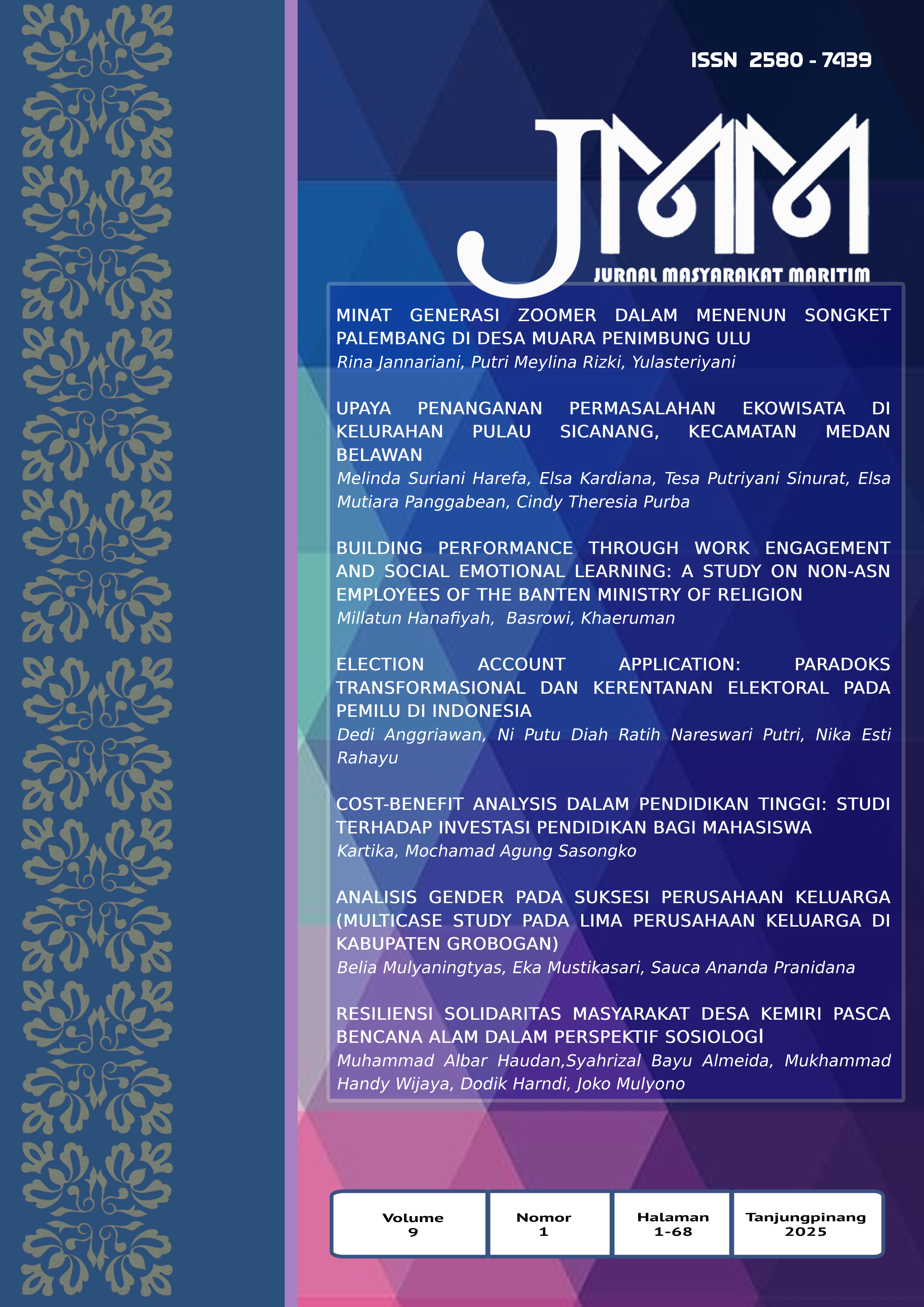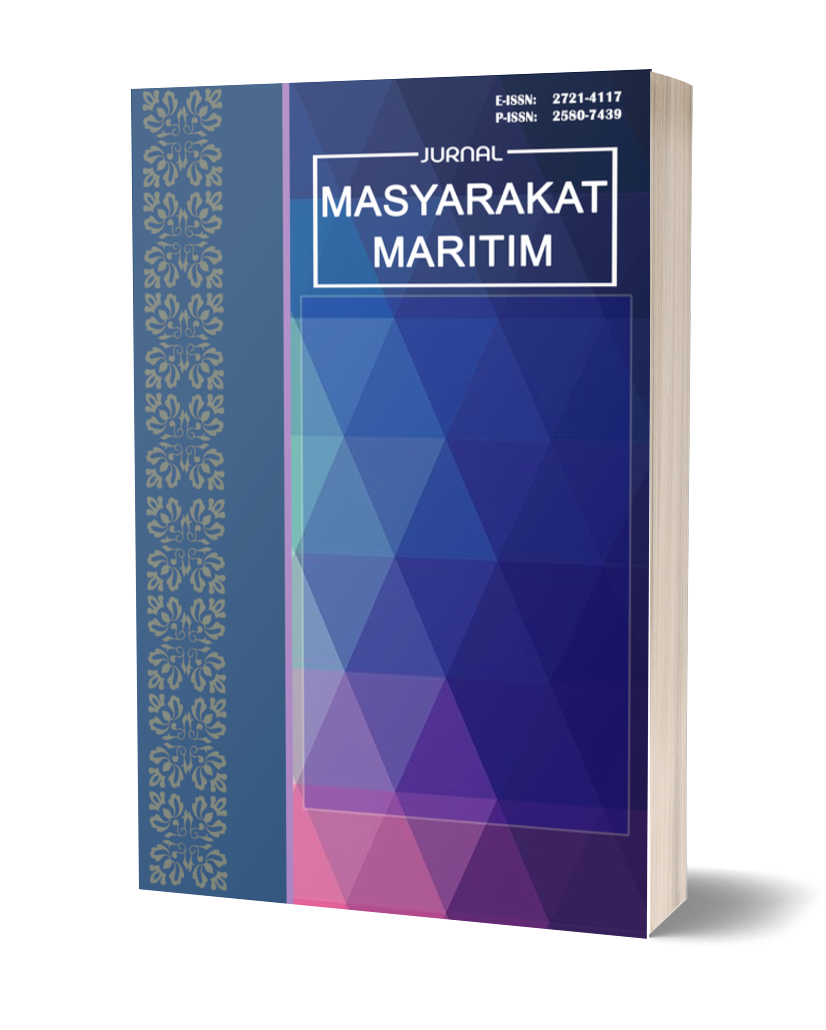Electorial Account Applications: Paradoks Transformasional dan Kerentanan Elektoral pada Pemilu di Indonesia
DOI:
https://doi.org/10.31629/jmm.v9i1.7332Keywords:
Akuntabilitas Elektoral, Paradoks Transformasional, Kerentanan Elektoral, Sosiologi Politik, Hukum PemiluAbstract
Penelitian ini bertujuan untuk menganalisis secara komprehensif paradoks transformasional dan kerentanan elektoral yang muncul akibat adopsi aplikasi akuntabilitas elektoral (electoral account applications) dalam kontestasi Pemilu di Indonesia. Dengan pendekatan interdisipliner, studi ini mengintegrasikan perspektif sosiologi, hukum, dan akuntansi untuk memahami dinamika kompleks teknologi ini. Metode penelitian yang digunakan adalah kualitatif deskriptif dengan pengumpulan data melalui studi pustaka, analisis dokumen regulasi, dan observasi daring terhadap implementasi aplikasi terkait. Secara spesifik, dari sudut pandang sosiologi, penelitian ini menyelidiki bagaimana aplikasi ini membentuk ulang lanskap partisipasi politik dan interaksi sosial antara aktor elektoral, yang berpotensi memicu polarisasi atau echo chamber. Dalam konteks hukum, analisis difokuskan pada kerangka regulasi eksisting dan tantangan penegakan hukum terkait transparansi dan akuntabilitas dana kampanye yang difasilitasi oleh aplikasi digital. Sementara itu, perspektif akuntansi mengeksplorasi efektivitas pelaporan keuangan kampanye digital dan potensi celah bagi dark money atau manipulasi data akuntansi yang terselubung. Hasil penelitian menunjukkan bahwa meskipun aplikasi akuntabilitas elektoral menjanjikan peningkatan transparansi dan efisiensi partisipasi, ia secara paradoksal memperkenalkan kerentanan baru, termasuk (1) penyebaran informasi bias dan manipulasi opini publik, (2) kesulitan dalam melacak dan mengaudit aliran dana ilegal atau tidak transparan akibat regulasi yang tertinggal,, serta (3) ilusi akuntabilitas finansial yang disembunyikan di balik kompleksitas teknis dan kurangnya standar audit yang ketat. Temuan ini menggarisbawahi urgensi pembaharuan kebijakan, pengembangan literasi digital pemilih, dan adaptasi kerangka hukum serta standar audit untuk memastikan integritas proses elektoral di era digital.
Downloads
References
Badan Pengawas Pemilu (Bawaslu). (2022). Laporan Pengawasan Dana Kampanye Pemilu. Bawaslu.
Badan Pusat Statistik. (2023). Statistik Pengguna Internet Indonesia 2022. BPS.
Badan Siber dan Sandi Negara (BSSN). (2024). Laporan Tahunan Keamanan Siber Indonesia 2023. BSSN.
Bennett, W. L., & Segerberg, A. (2012). The logic of connective action: Digital media and the personal personalization of contentious politics. Communication Theory, 22(4), 439-458.
Bogdan, R. C., & Biklen, S. K. (1998). Qualitative Research for Education: An Introduction to Theory and Methods (3rd ed.). Allyn & Bacon.
Bourdieu, P. (1984). Distinction: A Social Critique of the Judgement of Taste. Harvard University Press.
Braun, V., & Clarke, V. (2006). Using thematic analysis in psychology. Qualitative Research in Psychology, 3(2), 77-101.
Budiardjo, S., & Setiadi, R. (2021). Tantangan regulasi dana kampanye di era digital: Studi kasus Pemilu Indonesia. Jurnal Hukum Demokrasi, 10(2), 112-128.
Creswell, J. W., & Poth, C. N. (2018). Qualitative Inquiry and Research Design: Choosing Among Five Approaches (4th ed.). Sage Publications.
Dwight, K. S., & Williams, P. J. (2019). Digital campaign finance and the challenge of transparency. Election Law Journal: Rules, Politics, and Policy, 18(4), 312-328.
Forensic Accounting Review. (2021). The rise of digital fraud in political campaigns. Forensic Accounting Review, 15(2), 89-105.
Frank, R. H., & Meyer, S. E. (2018). Principles of Accounting. McGraw-Hill Education.
Garcia, L. M. (2019). Digital democracy and the new vulnerabilities of elections. Journal of Political Technology, 8(3), 250-265.
Habermas, J. (1989). The Structural Transformation of the Public Sphere: An Inquiry into a Category of Bourgeois Society. MIT Press.
Hill, K. A., & Hughes, J. E. (1997). Computer-mediated political communication: The Internet and the American elections. Political Research Quarterly, 50(1), 3-23.
Howard, P. N., Woolley, S., & Calo, R. (2018). Compromised democracy: The weaponization of social media. Oxford University Press.
Jones, R., & Chen, Y. (2021). The Promise of E-Governance in Developing Countries. Oxford University Press.
KPMG. (2022). The Future of Audit in a Digital World. KPMG International.
KPMG. (2023). Evolving Audit: The Impact of Digital Transformation. KPMG International.
KPU (Komisi Pemilihan Umum). (2023). Peraturan KPU Nomor [Nomor Tahun] tentang Dana Kampanye. KPU.
Lee, S. (2018). The impact of social media on political participation: A comparative study. International Journal of Communication, 12, 1980-2000.
Livingstone, S. (2018). The Class: Living and Learning in the Digital Age. MIT Press.
Miller, G., & Brewer, J. D. (2003). The A-Z of Social Research: A Dictionary of Key Social Science Methods. Sage Publications.
Mutz, D. C. (2006). Hearing the Other Side: Deliberative Versus Participatory Democracy. Cambridge University Press.
Nakamura, H. (2022). Cybersecurity threats in electoral processes: A global perspective. Cyber & Political Science Journal, 5(1), 45-60.
Neuendorf, K. A. (2017). The Content Analysis Guidebook (2nd ed.). Sage Publications.
Norris, P. (2017). The Future of Political Campaign Finance. Routledge.
Pariser, E. (2011). The Filter Bubble: What the Internet Is Hiding from You. Penguin Press.
Power, M. (1997). The Audit Society: Rituals of Verification. Oxford University Press.
Putnam, R. D. (2000). Bowling Alone: The Collapse and Revival of American Community. Simon & Schuster.
Seidman, I. (2013). Interviewing as Qualitative Research: A Guide for Researchers in Education and the Social Sciences (4th ed.). Teachers College Press.
Smith, J. A. (2020). Digital Innovation in Electoral Systems. Cambridge University Press.
Smith, A., & Jones, B. (2020). The impact of digital platforms on political engagement and accountability. Journal of Digital Democracy, 7(1), 45-62.
Sunstein, C. R. (2017). #Republic: Divided Democracy in the Age of Social Media. Princeton University Press.
Undang-Undang Nomor 7 Tahun 2017 tentang Pemilihan Umum. Lembaran Negara Republik Indonesia Tahun 2017 Nomor 182.
Undang-Undang Republik Indonesia Nomor 11 Tahun 2008 tentang Informasi dan Transaksi Elektronik (UU ITE). Lembaran Negara Republik Indonesia Tahun 2008 Nomor 58.
Volkov, M., & Fagan, B. (2014). Cybercrime and the Law: A Guide for Australian Legal Practitioners. LexisNexis Butterworths.
Warren, J. D., Jones, A. H., & Smith, C. R. (2018). Blockchain technology and the future of auditing. Journal of Accounting and Finance, 22(4), 56-72.
Yin, R. K. (2018). Case Study Research and Applications: Design and Methods (6th ed.). Sage Publications.
Additional Files
Published
Issue
Section
License
Copyright (c) 2025 Dedi Anggriawan, Ni Putu Diah Ratih Nareswari Putri, Nika Esti Rahayu (Author)

This work is licensed under a Creative Commons Attribution-ShareAlike 4.0 International License.














